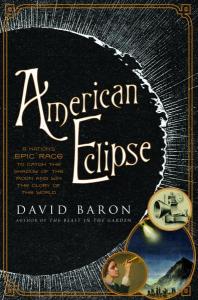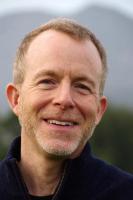David Baron: American Eclipse
A NATION’S EPIC RACE TO CATCH
THE SHADOW OF THE MOON AND
WIN THE GLORY OF THE WORLD
David Baron
Liveright (A Division of W.W. Norton), June 6, 2017, $27.95
ISBN-10: 1631490168; ISBN-13: 978-1631490163
Baron reports:
The origins of American Eclipse stretch back nineteen years, and began with a personal obsession and an astronomical news peg.
In February 1998, I witnessed my first total solar eclipse ― in Aruba ― and was spellbound. Standing beneath the sun’s glorious corona proved magical, and I vowed to repeat the experience. Indeed, since then I have continued to stalk eclipses across Europe, Australia, and Asia.
I also resolved back in 1998 that I would write a book about eclipses, but not right away. Even as a rookie eclipse chaser, I knew that the grandest eclipse of our era would occur on August 21, 2017, when the moon’s shadow will, for the first time in 99 years, traverse the entire breadth of the continental United States. It seemed obvious that the summer of 2017 offered the right opportunity to release my book. But what, precisely, would the book be about?In 2011, I began hashing out ideas with my agent and soon settled on a topic. I would tell the story of the great American eclipse of 1878, which crossed the nation’s Wild West, lured many Gilded Age scientists (including Thomas Edison and the Vassar astronomer Maria Mitchell) to the frontier, and inspired America’s rise as a scientific power.
Thank goodness I started work six years in advance of publication. Writing a history book proved a gargantuan task. Here are some things I learned along the way:
- The Internet has, unsurprisingly, made historical research easier than ever. The papers of Thomas Edison and other bygone scientists, and vast newspaper collections, are available online. Google Books offers ready access to nineteenth-century tomes.
- The Internet is, however, no substitute for on-site archival research. My most exciting finds came while poring through old letters, diaries, and news clippings at the National Archives, Library of Congress, and university manuscript collections. What a thrill it was to hold letters written by Edison and Alexander Graham Bell.
- The travel involved with visiting archives can quickly get expensive. If you want to write a science history book, do what I did: contact the Alfred P. Sloan Foundation. The book grant I received was a godsend.
Contact info:
- David Baron: 303-641-3417, dhbaron@gmail.com
- Book website: www.american-eclipse.com
- Publicist: Peter Miller, 212-790-7259, pmiller@wwnorton.com
- Agent: Todd Shuster, 212-765-6900, aevitascreative.com
NASW members: will your book be published soon? Take advantage of this opportunity for shameless self-promotion. Submit your report for Advance Copy.
Tell your fellow NASW members how you came up with the idea for your book, developed a proposal, found an agent and publisher, funded and conducted research, and put the book together. Include what you wish you had known before you began working on your book, or had done differently.
See www.nasw.org/advance-copy-submission-guidelines.
Thinking of writing a book? If you are a NASW member, you may access a list of more than 150 books and online resources to help you craft your book proposal, find an agent and funding sources, negotiate your contract, learn about self-publishing, publicize and market your book, and more at www.nasw.org/article/write-book.
Send book info and questions about book publishing to Lynne Lamberg, NASW book editor, llamberg@nasw.org.





